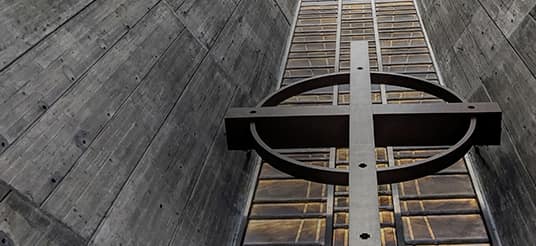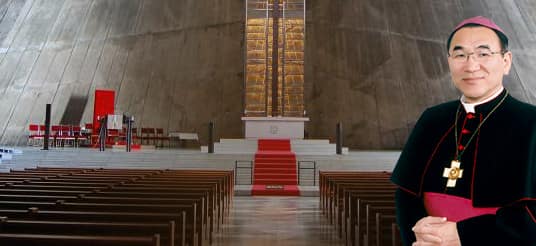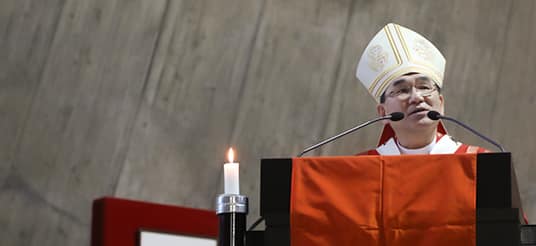お知らせ

福音宣教省長官フェルナンド・フィローニ枢機卿からの書簡
2017年08月10日
福音宣教省長官フェルナンド・フィローニ枢機卿は、9月に訪日予定です。
訪日に先立ち、日本の司教たちに向けて、メッセージを送られました。
この文書の邦訳、英語版をウェブサイト上で、公開しました。
親愛なる兄弟である司教様
わたくしは、わたしたちの地方教会で羊飼いの使命を行う者たちに今日重くのしかかっている数多くの問題について熟考しながら、司祭たちの生活と役務についてのいささかの考察を、皆様と分かち合いたいと思っております。
5月7日の日曜日、ローマ教区で10人の新司祭が叙階されたときに、フランシスコ教皇は率直でよく心に響く言い方で次のように述べられました。
「実行の模範を伴わない人の言葉には効果がありません。裏表のある生活は教会における深刻な病です。皆さんが主イエスによって選ばれたのは、キャリアをさらに上げるためではなく、奉仕をささげるためです。」
今日見られるほどの微妙な状況の中で司祭に使命が委ねられたことはかつてありませんでした。この理由から、司教は誰でも、特別な霊的な父性を、すなわち神ご自身にその根源を持つ父性(「すべての父性がそこに源を有する」(エフェソ 3:15参照)を、自分の司祭たちに対して感じるようでなければなりません。司教は、父なる神に倣い、その司祭たちに対して分かたれることのない配慮をすべき者なのです。父性によって司教は、すべての司祭に対して心を砕く父であること、そのざらざらした表現に磨きをかけて丸くし、試練の中にある司祭を励まし、その過ちを正し、一つに結ばれた司祭団の家族というつながりの中でその資質が評価されるように計らうのです。
何よりもまず司教の父性は、自分の司祭たちを直接に知ることのうちに現れます。司教が司祭たちの名前さえ知らない場合が起こることはごく稀であるとはいえません。これは司祭にとって多大な苦しみの原因となります、なぜなら、それぞれの名前は一人の個人の全人生、洗礼という人生の第一歩から始まった人生の要約を含んでいるからです。名前はわたしたちの家族の起源、わたしたちの健康状態、わたしたちの人間的で感情的な状況、そして、わたしたちの様々な司牧活動の段階のことを思い出させます。もし、司教が、自身を「父」と呼ぶならば、司祭が真に「息子」のようであると感じるならば、そして、同時に、司牧においては信頼できる共労者であろうとするならば、司教には、司祭への感性豊かで親密な接触が絶対に欠くことができない大切なものであります。
司教は、常に第一に重要な善である、人々と諸国民への福音を宣言することを、絶えず追求しながら、司祭への尊敬と礼節を守り、自分の得た適切な関心と考察の成果を司祭へ伝達し、それを司祭たちと明確に分かち合うことが必要であります。
司教様、とりわけ、自分の個人的な教えによって人々を過ちに導き、また人々を罪と死の罠にかけて、自分が盗人となり羊を搾取する牧者の罪ほど(ヨハネ10:1参照)、キリストの体である教会を苦しめるものはありません。司祭たちの中の分裂、司教への尊敬と司教との協力の欠如、一般信徒への適切な配慮のなさ、司牧者としての責任意識の欠如、そして、何人かによって惹き起こされる醜聞など、これらすべては、司牧活動の効果を小さくし、羊の群れの羊飼いとしての司祭のイメージを曇らせるのです。
この点において、わたくしは、あなたの地方教会における司祭たちのどんな姿が浮かび上がってくるのか、とお訊ねしないではいられません。司祭は単なる聖なるものの担当者、分与者、単なるソーシャル・ワーカーですか。あるいは、司祭の生き方が現わすべき聖性とは全く調和しない、自分自身あるいは自分の家族のために快適な人生を整えることを求める司祭ですか。
実際のところ、「我々が司祭であるということは、単純に、キリストに結ばれて生きるという、新しく根源的な存在の在り方なのです。その本質において、それは秘跡のうちにわたしたちに永久に付与されたのであります。しかしながら、もしわたしたちの生活が秘跡の真理に入ることによって拓かれていかないならば、わたしたちの存在の上に記されたこの新しい刻印はわたしたちにとっては断罪となりうるものであります。」(ベネディクト16世、2009年の聖香油のミサの説教)。
司祭個人の聖性は、司祭の司牧的配慮に託された人々、自己犠牲と寛大さの精神で仕えるべき人々によって感じられるものでなければなりません。司祭の祈りの生活は内部からその使徒職を養います。ご聖体を愛する司祭たちが大いに必要とされています。というのは、司祭たちはご聖体から司牧的な使命のための深い目的を引き出すのです。教皇ベネディクト16世がおっしゃいましたように、「この(司牧的使命)は人自身から来るのではなく、聖なるものにその起源を持つのです。」(2010年5月26日の一般謁見)。
司祭各自とすべての司祭へ注意を向けるという司教の具体的な姿勢によって、司教の父性の特徴が実行に移されるのであれば、司祭たちの生涯養成は、司教の父性を実際に行うための最も大切な方法の一つである、と言えます。実際において、それは、今日の文化的背景の中での司祭としての生活の重要な要素を構成するものです。新しい司祭養成の根本方針」(Ratio Fundamentalis Institutionis Sacerdotalis)で述べられておりますように、「生涯養成は具体的でなければなりません、すなわち、司祭の現実を具体化し、兄弟愛に生きること、年ごとの霊的な修養、月の静修、霊的な指導、共同生活など。」(参照、同指針80-88)
司教職において親愛なる兄弟の司教様、わたしはこれらの考察をあなたに委ね、これをあなたが司祭たちと分かち合うことをお願いします。聖母マリア、使徒たちの女王、そして、司祭たちの母は、司祭としての旅路にある皆様の愛する息子たちに、いつも優しく同伴してくださるであろうことを確信しております。
深い感謝を込めて
キリストにおいて
福音宣教省長官
枢機卿 フェルナンド・フィローニ
Dear Brother in the Episcopacy,
I would like to share with you some reflections on the life and ministry of
priests, considering the numerous problems that currently weight upon those
who exercise the mission of Shepherd in our local Churches.
On Sunday, May 7th on the occasion of the ordination of 10 new priests
for the Diocese of Rome and in his direct and effective manner, Pope Francis
stated, “Words without personal example are ineffective. A double life is a
serious disease in the Church… [You] were chosen by the Lord Jesus, not to
further [your] careers, but to offer [priestly] service.”
Never before has the mission entrusted to priests found itself in such a
delicate situation as it does today. For this reason, every Bishop should feel a
special spiritual paternity toward his priests, a paternity that has its roots in God
Himself, “from whom all fatherhood has its origin” (Eph. 3:15). In imitation of
God the Father, a Bishop is to give undivided attention to his priests. He is to be
a caring father to every priest, helping to round out his rough edges,
encouraging him in his trials, correcting his errors, and making his qualities
appreciated within the context of a united presbyteral family.
The fatherhood of a Bishop manifests itself, first of all, in the direct
Knowledge of his priests. Not infrequently does it occur that a Bishop does not
even know the names of his priests. This is a cause of much suffering because
each name contains a summary of a person’s entire life, a life that took its first
steps at Baptism. It calls to mind our family of origin, our state of health, our
human and affective condition, and the different stages of our ministry. A
sensitive and friendly approach is absolutely essential if a Bishop is to call
himself a ‘father’ and a priest is to truly feel like a ‘son’ and, at the same time, an
authentic coworker in the ministry. A Bishop needs to communicate clearly with
his priests, the fruit of due concern and reflection, conveyed with respect and
decency, and always in search of the primary good: the proclamation of the
Gospel to persons and peoples.
Your Excellency, nothing causes the Church – the Body of Christ – to
Suffer as much as the sins of her Pastors, particularly those who become thieves
and exploit the sheep (cf.Jn 10:1), either because they have led the people into
error by means of their personal doctrines, or because they have trapped them
in the snares of sin and death. Divisions among priests, the lack of respect and
collaboration with the Bishop, the absence of due consideration toward the lay
faithful, the scarcity of pastoral responsibility and the scandal caused by some,
all reduce the effectiveness of pastoral work and cloud the image of the priest
as a shepherd of God’s flock.
On this point, I cannot help but ask, what image of the priest emerges in
your local Church? Is the priest a mere functionary and dispenser of sacred
things or a mere social worker, a priest who seeks to “arrange” a life of comfort
for himself or for his family, living a life not at all in harmony with the holiness
that a priest’s life should manifest? In reality “our being priests is simply a new
and radical way of being united to Christ. In its substance, it has been bestowed
on us forever in the sacrament. But this new seal imprinted upon our being can
become for us a condemnation, if our lives do not develop by entering into the
truth of the Sacrament” (Benedict XVI, Homily for the Chrism Mass, 2009).
The personal holiness of the priest should be felt by those who are
entrusted to his pastoral care, those whom he is to serve in a spirit of self-denial
and generosity. His life of prayer will nourish his apostolate from within. There
is a serious need for priests who are in love with the Eucharist, from which they
draw the profound purpose for their pastoral mission. As Pope Benedict XVI
once said, “This [pastoral mission] does not come from man himself, but it has
its origins in the sacred” (General Audience, 26 May 2010).
If concrete gestures of attention toward each and every priest
characterize the fatherhood of the Bishop, then the ongoing formation of priests
is one of the most significant ways to exercise that fatherhood. It constitutes, in
fact, an important dimension of priestly life in the current cultural context. As
stated in the new Ratio Fundamentalis Institutionis Sacerdotalis, “Ongoing
formation must be concrete, that is to say embodying priestly realities and lived
in fraternity: annual spiritual exercises, monthly retreats, spiritual direction,
common life” (cf. nn. 80-88).
My dear brother in the Episcopacy, as I entrust these reflections to you
and kindly ask you to share them with your priests, Iam certain that Our Lady,
Queen of the Apostles and Mother of Priests, will always gently accompany
these your beloved sons on their priestly journey.
I assure you of my profound gratitude and remain
Sincerely Yours in Christ,
Fernando Cardinal Filoni










